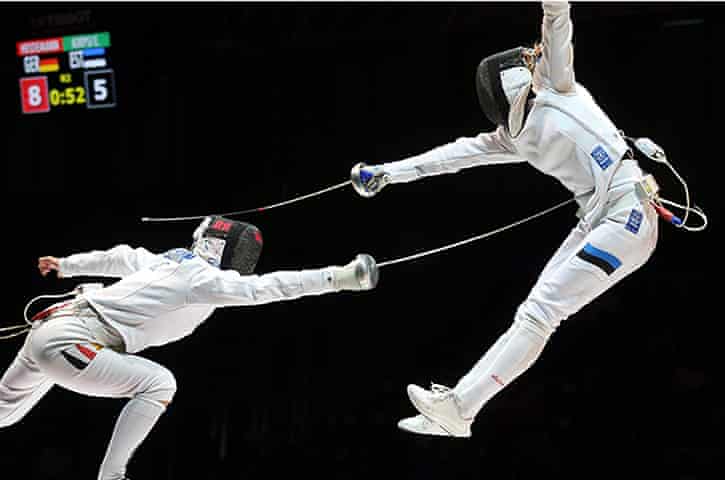What does touche mean?

Touché (pronounced tuːˈʃeɪ "too-shay") is a French word that is used in the English language. Its origins come from the sport of Fencing, where a "touché" means that you've successfully touched your opponent (and scored a point) with your weapon.
In English conversation, however, it has nothing to do with fencing.
It is an expression of acknowledgement to someone's witty remark, perhaps in an argument. It often is said in a tone similar to "Good/fair point." or "I guess you're right." and is usually used in a casual way.
For example:
A: I hate ordering food delivery, it takes too long.
B: We only ordered because you were too lazy to cook.
A: Touché. I'll wait patiently then.
or
A: That shirt is way too big for you.
B: You're the one who bought it for me!
A: Touché.
or
A: My sister never does the dishes.
B: Even when she does, you complain that she doesn't do it well.
A: Touché. We should just get a dishwasher.

used to acknowledge a hit in fencing or the success or appropriateness of an argument, an accusation, or a witty point
In an argument, touché means that you're admitting that they made a good point, or when someone has made a good comeback.
Example
"‘You haven't contributed much, this evening.’ ‘How could I have?’ ‘Touché. I do go on.’"
You say 'touché' when you want to admit that the other person in an argument has won a point, usually with a short and witty remark.
Hi, this word is used when you're having a discussion or argument with someone and that person makes a clever or convincing point.
It comes from the sport of fencing and you say it to acknowledge a hit by your opponent.
THE MEANING OF TOUCHÉ
E.g.
Person 1: I believe everyone should have the right to vote.
Person 2: Touché!
I hope this helps:-)
Have a great day!
T. Nick
Used as an acknowledgement during a discussion of a good or clever point made at one's expense by another person.
"‘You haven't contributed much, this evening.’ ‘How could I have?’ ‘Touché. I do go on.’"
Touche is a vocabulary word that means "you've got me" or "you're right". When someone says "touche" they are usually saying "you are correct."
Example:
"If you walk your dog in the morning, you won't have to walk him in the afternoon."
"Touche, I'll walk him in the morning."
Example:
"If you walk your dog in the morning, you won't have to walk him in the afternoon."
"Touche, I'll walk him in the morning."
Touché! 😄
Meaning
Used in a discussion to say to someone that has made a clever or good point that makes you look like you lost.
This is a witty (clever) remark to use if someone has won a point against you and you don't want to show your embarrassment...
Examples
Situation:
Classroom - Professor makes a point about something but a student in the class corrects him. The professor realises that the student is right but doesn't want to show his embarrassment so he says: “Touché.”
Conclusion
This is a quick (joke-style) phrase that allows you to feel and look witty, while hiding a little bit of embarrassment in a situation where you look like you don't know what you're talking about.
Meaning
This simply means that somebody has given a superior answer, made a better comment or performed a better action than the other person in a situation.
Pronunciation
Touché - the word is usually written with the French accent as it is spoken with a French pronunciation - /tuːˈʃeɪ/ or 'too shay.'
Examples
Last week you fired me from my job. This week I won the lottery, bought the company and fired you! Touché
You cheated on me but didn't think you would get caught. I changed the locks on the house while you were out cheating. Touché.
Conclusion
A short useful one-word response that carries a lot of meaning - usually a form of attack or counter-attack. This isn't surprising as it was originally a French term derived from the sport of fencing when the blade 'touched' the opponent and the contest was won.
Touché - Directly from the French 'touched', as used in the sport of d'escrime, or fencing.
It's use in English means that--during a disagreement, discussion or dispute--the countering speaker has offered a significant point, argument, or experience to the conversation.
A: I've never been to France, but I don't think they have any cheese.
B: Well, I have lived in France for 20 years now and can tell you they have a lot of cheeses.
A: Oh...ok...touché.
"You say you don't have time to practice English, yet you seem to find time to watch every single episode of that new Netflix series."
"Touché."
If somebody exposes you with a particularly good argument, you might respond with "Touché!"
Word History
As you might guess by looking at it, 'touché' is a word borrowed from the French language (it means 'touched').
Its use in English first came from the sport of fencing- when one of the contenders manages to touch their opponent with their weapon, the would say, 'touché!' (like, 'I touched you!)
So, these days, when somebody says 'touché!' in response to a clever argument or statement, this is like saying, 'You got me there!' or 'Okay, I can't argue with that!'.
An example from the Simpsons:
Bart: want to go with you, Dad.
Homer: Don't you have school?
Bart: Don’t you have work?
Homer: Ah, Touché.
It means I made a point that was as good or greater than yours.
Touche is a French word that is used when someone makes a particularly good point.
"I may not be good at Math, but you are even worse at English", said Bart. "Touche', Bart", replied George.
Touche' is a word that has to do with a clever point being made during conversation.
"Touché" is actually a French word. It is the past participle of the verb toucher (to touch), so "touché" actually means, literally "touched".
Fencing
But what does it mean? The word comes from fencing. That is, this sport:

When the player's sword hits the body of their opponent, the word "touché!" is cried, which means, literally, "I am touched!" In this context, though, it has the sense of "I am hit!" or, essentially, "You win!"
In Context
Now, we know that context is essential in understanding language. Even though the term originally came from fencing, nowadays it is used more frequently in arguments, usually in informal contexts. In a formal, academic debate, it would be considered too humorous and informal. So you can, for example, say it to a friend who defeats your argument – usually using your own logic against you.
Examples
'Why do people do that? It's so stupid.'
'I saw you doing that yesterday.'
'Touché!'
We see from this little conversation, above, that "touché" is a way of acknowledging defeat. It is a way of saying 'you got me!' and perhaps is a way of acknowledging our hypocrisy (as in the example above).
Simple
"Touché!", if you can learn to use it in the correct context, can be a witty way of showing your humility with a friend or informal relation. It is also a nice way of introducing some French into your English, which is often considered a mark of refinement. However, "touché!" is quite a rare bit of English, so don't worry about using it. There is only really one context where you would use it nowadays, when you are defeated in an informal argument.
Introduction
Touche (pronounced /tuːˈʃeɪ/), from the French word "touché" meaning "to touch", is used when you want to agree with what someone else has said. It is often used at your own expense and therefor can have a negative connotation.
Origin and Meaning
Like its French origin in the sport of Fencing where players would call out the word when they manage to touch their opponent with their weapon, this word is used like an attack in a verbal battle.
Example 1:
"Oh please," I rolled my eyes. "You're lactose intolerant. You're only eating the cheese because I want it."
"Touche, Daniel."
Example 2:
"What are you doing here, Teacher John? Shouldn't you be at work?"
"I could ask you the same thing Jake, shouldn't you be at school?"
"Touche," Jake said and quickly walked away.
Example 3:
Two strangers meet at a party. The first one says to the other: "what's up with your hair?", the other, offended, says: "what's up with yours?" the first one replies "touche" and leaves.
Conclusion
Use "touche" in a conversation when the other person makes a very good point about a sensitive topic to you and you want to keep the conversation light and pleasant and don't want to turn it into an argument. It can also be used for comedy very well so it is a great word to learn.
The word that can be used when a cleaver point is made by someone when having a conversation.
Meaning of the word touche:
The word touche is used, when one makes a point when having a conversation, at the other persons expense. The other person acknowledges their point.
The meaning of "touche"
This is an expression used to say that you feel the same about a certain subject as another person. Or that you understand things in the same way. It would be the same as saying: Me too! I also feel this way!
It is also used when two people have the same exact experience.
Ditto!
Examples:
I had a very busy day today and didn't have any time to phone you!
Touche! (Me also!)
We went to that new restaurant on the corner and they gave us the worst service.
Touche! (Us as well!)
Conclusion
This is a very nice and short word to use. But only use it when you fully grasp the meaning of it.
A slang phrase used as an acknowledgement of the success or appropriateness of a point made by another during a conversation. In other words, they made a really good point in the discussion.
It can also highlight a good argument or accusation being made at the expense of another person.
'You say you don't like Italian food but you always eat pizza'
'Touché'
In a situation where a student corrects the teacher, the teacher could respond 'touché'
The full definition of Touche in English language with some examplinary sequences.
Touche definition
to͝o-shā
It's an interjection which is used to acknowledge a successful point in debating or a witty retort.
Touche means “touch” in french. It is also a term from fencing, where the fighter lightly “touches” the opponent with the tip of the foil (fencing sword). People sometimes say “touche!” in a conversation to mean someone has said something clever. I think it is like winning a point in an argument.
So in simple terms: Two people are arguing. One person says something very clever, and wins the argument. The other person says 'touché'.
'Touché' means: you got me, you win the argument.
Examples1:
person#1: "i might be bad at english but not as bad as you!"
person#2:"haha touche"
Example 2:
Person A: I hate your pants.
Person B: You have the same pair!
Person A: Touché.
Conclusion
It should be noted that, TOUCHE is a borrowed word from French. From past participle of toucher to hit or wound in fencing from Old French touchier to touch.
Used as an acknowledgement during a discussion of a good or clever point made at one's expense by another person.
"‘You haven't contributed much, this evening.’ ‘How could I have?’ ‘Touché. I do go on.’"
Used to admit that someone has made a good point against you.
Touche is a French word widely used in English when acknowledging that someone else has won a point in an argument, usually because they said something witty. It's like saying “You're right.
Recognition when a fencer hits his target.
When the college professor realized his students had properly corrected him, he gave him credit by jokingly saying, Touche.
Touche is a French term which means, touched, when a fencer hits his target, to admit that the other person in an argument made a good point, or success of a witty comment.
Synonyms and Antonyms
Synonyms: discomfort, good thinking, well done, props, put down, affront, indignity.
Antonyms: elevation, resistance, honor, respect, praise
Sentences
“Touché” is all I can say because you definitely put me in my place with your biting retort.
When the college professor realized his student had properly corrected him, he gave him credit by jokingly saying, “Touché.”
Conclusion
Using touche in your writing will set you apart from others. This is a fun word to add to your growing vocabulary.
Commonly used as an acknowledgement during a discussion of a good or clever point made at one's expense by another person. It is of French origin.
The meaning of touche
The word literally means touched. When you hit your opponent in fencing, they say touché to signify a point against them. In an argument, touché means that you're admitting that they made a good point, or when someone has made a good comeback.
The definition of touché is an expression acknowledging the clever response or point made by someone in a discussion or debate. An example of touché is a response given to someone who says "grass can also be red, blue or even purple" in response to a friend telling them "the grass is always greener."
Word to be used to show a come back in debate or discussion.
What does touche mean?
1.
used as an acknowledgement during a discussion of a good or clever point made at one's expense by another person.
"‘You haven't contributed much, this evening.’ ‘How could I have?’ ‘Touché. I do go on.’"
2.
(in fencing) used as an acknowledgement of a hit by one's opponent.
touché /tuːˈʃeɪ/ from French
a way to say- you're right
you say touché when you want to acknowledge or admit that someone has made a good point against you in a conversation or a discussion
Example:
A: Is Joan late for work again?
B: Are you her boss?
A:Touché...
Touche, also written touché is used as an exclamation
The word comes from French and the sport of fencing.
Used as an acknowledgement during a discussion to accept a good or clever point made against you.
Example
"You haven't said much.”
“Well, you don’t let me speak!”
“Touché. I do talk a lot.”
意思: used to acknowledge a hit in fencing or the success or appropriateness of an argument, an accusation, or a witty point
例句: In case you hadn't guessed it already, caliper spring tension appears to have been reduced, because the brakes definitely have a much lighter touch. Touché, Shimano!
“Touché” is an expression borrowed from French used during a debate or discussion to express that someone has made a good point, or said a good comeback line.
Pronunciation
"Two-SHAY." The stress is on the second syllable.
Sound (UK and US): https://dictionary.cambridge.org/pronunciation/english/touche
Example:
Person A: You only think that because that's what you were raised to believe.
Person B: Or, maybe you only thing THAT because that's what YOU were raised to believe.
Person A: Touché
Dictionaries
tou·ché
/to͞oˈSHā/
Definition
used as an acknowledgment during a discussion of a good or clever point made at one's expense by another person.
A: “You haven't contributed much, this evening.”
B: “How could I have?”
A: “Touché."
You say touché when you want to admit that the other person in an argument has won a point, usually with a short and witty remark.
Roots
Origin

Originates from French, means "touched"
Touche
used to admit that someone has made a good point against you in an argument or discussion or / used to emphasize in a humorous way that someone has made a very good point during an argument so you You say touché when you want to admit that the other person in an argument has won a point, usually with a short and witty remark.
"You say we should support American industries, but you always drink French wines." "Touche."
More detail
The word literally means touched. When you hit your opponent in fencing, they say touché to signify a point against them. In an argument, touché means that you're admitting that they made a good point, or when someone has made a good comeback
Definition of touché:
Touche nowadays is usually used in a witty and fun way to joke with your friends.
The word literally means touched (French Origin).
When you hit your opponent in fencing (A French Sport), they say touché to signify a point against them.
In an argument, touché means that you're admitting that they made a good point, or when someone has made a good comeback.
How to us touché in day to day English:
Touche nowadays is usually used in a witty and fun way to joke with your friends. Such as:
Jade: I think we should get you a bigger beanie, your head is very big.
Ethan: I think so too, at least my head doesn't need a size large beanie as yours does.
Jade: Touché!
First Known Use of touché
1897, in the meaning defined above
History and Etymology (origin of the word) for touché
French, from past participle of toucher to touch, from Old French tuchier
Concluding the definition of touché:
—used to acknowledge a hit in fencing or the success or appropriateness of an argument, an accusation, or a witty point



























